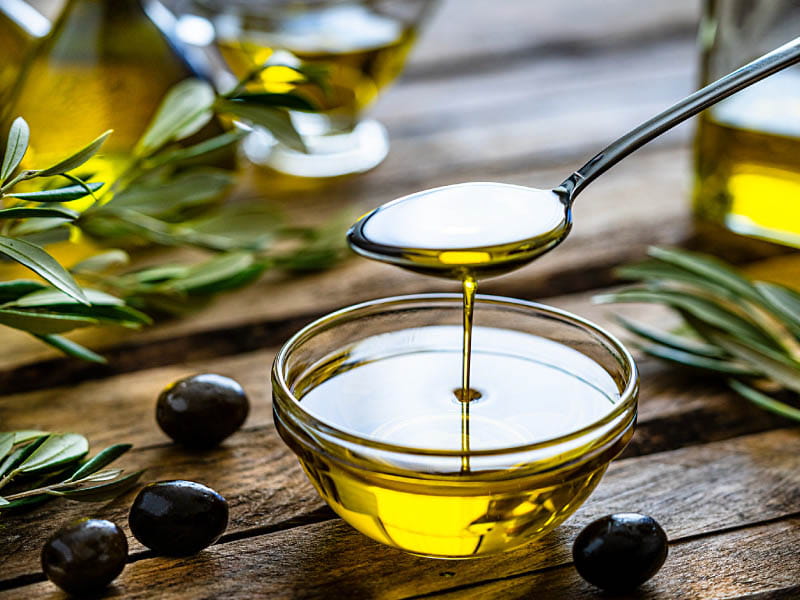The benefits of adding a drizzle of olive oil to your diet
By KC Wright, American Heart Association News

The ancient Greeks were on to something when they referred to olive oil as an "elixir of youth and health." Centuries later, research offers evidence about the benefits of olive oil in our daily diets.
Consuming more than half a tablespoon of olive oil a day may lower heart disease risk, a 2020 study found. And earlier this year, researchers reported in the Journal of the American College of Cardiology that people who ate more than half a tablespoon per day had lower rates of premature death from cardiovascular disease, Alzheimer's disease and other causes compared to people who never or rarely consumed olive oil.
"Olive oil is the hallmark of the Mediterranean diet, and its link to lower mortality is well established in southern European countries. But this is the first long-term study to show such a health benefit here in the U.S.," said Dr. Frank Hu, the study's senior author and a professor of nutrition and epidemiology at Harvard T.H. Chan School of Public Health in Boston.
Among all edible plant oils, olive oil has the highest percentage of monounsaturated fat, which lowers "bad" LDL cholesterol and increases "good" HDL. It's been shown to lower blood pressure and contains plant-based compounds that offer anti-inflammatory and antioxidant properties known to reduce the disease process, including heart disease.
Olive oil is derived from the fruit of the olive tree, cultivated mainly in the Mediterranean for over 5,000 years. Spain is by far the largest producer of olive oils in the world, followed by Italy and Greece. In the 18th century, Spanish missionaries brought olives to California and planted them along the coast. Today, over 40,000 acres of olive trees grow exclusively for oil in California, Arizona, Georgia, Florida, Oregon and Hawaii. Just 5% of the 90 million gallons of olive oil consumed annually in the U.S. are produced here, according to the American Olive Oil Producers Association.
Several grades of olive oil are found on store shelves in the U.S., from regular to extra virgin olive oil – commonly known as EVOO. EVOO is the staple fat source for the Mediterranean diet, considered one of the healthiest dietary patterns and a diet emphasized by the American Heart Association for preventing cardiovascular disease.
EVOO is the fatty fraction of olive juice extracted only by mechanical and physical processes without any refinement. It's the lack of refinement that maintains both its sensory and health properties. "First-pressed" and "cold-pressed" are terms that emphasize the EVOO is an unrefined, natural product that has undergone a single, simple milling process without any processing to alter its quality.
Regular olive oil, on the other hand, has been refined, bleached, deodorized and then blended with 5% to 15% EVOO. "Pure" or "light" are marketing terms used for olive oil that has been refined and mixed with a small amount of EVOO to yield a product that's lighter in flavor, aroma or color.
Hu's recent study did not differentiate between grades of olive oil, but he said European studies have shown better health results with EVOO which has a higher amount of plant compounds and antioxidants than other edible oils. Hu said future research may compare the different grades of olive oils for beneficial effects.
When cooking, olive oil can be a healthy substitute for butter, margarine and other types of fat. In Hu's study, for example, replacing unhealthy fats with olive oil was associated with a lower risk of dying. "Olive oil is a much healthier replacement for dietary fats, especially animal fats," Hu said.
Other liquid vegetable oils make good substitutes, too. Strong evidence demonstrates the heart-healthy benefits of soybean, canola, corn, safflower, sunflower and other plant oils.
According to Christopher Gardner, director of nutrition research studies at Stanford Prevention Research Center in California, no single food or nutrient has as much health impact as the whole dietary pattern.
"A moderate amount of plant-based fat and reduced intake of refined grains and sugars are important goals for any healthy dietary pattern," said Gardner.
EVOO can be more expensive than other vegetable oils, so it works well to keep several healthy plant oils on hand for different uses.
Since EVOO has a fragrant aroma and strong flavor, its best uses may be to dress salads or vegetables, in place of butter on whole-grain bread, or in Thanksgiving's mashed potatoes. Canola oil is virtually flavorless, so it tends to work well in baked goods. Other plant oils can be used for sauteing, marinades and more.
If you have questions or comments about this American Heart Association News story, please email [email protected].





